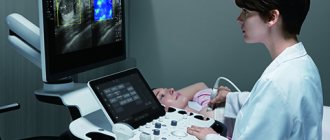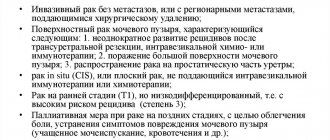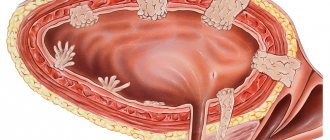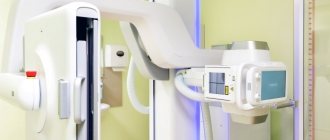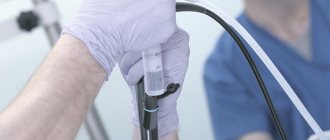Has it ever happened to you that illness strikes you very unexpectedly and, it seems, for no reason? For example, in the case of cystitis (inflammation of the mucous membrane of the bladder), you didn’t catch a cold, dressed warmly, didn’t even have sexual intercourse recently, but cystitis still appeared?
In this case, you should pay attention to your psychological state - perhaps you are going through not the calmest times in your life.
In this article we will understand such concepts as “psychosomatics” of cystitis in women and “somatopsychics” and see what impact psychological problems can have on the genitourinary system of women and whether they can provoke cystitis.
What is psychosomatics
From historical information it is known that the term “psychosomatic” (psychosomatic disease or problem) appeared in the first half of the 19th century. and only a century later it became widespread.
Psychosomatics is a field of medicine and psychology that studies the impact of psychological causes on the occurrence and course of somatic (physical) diseases.
This method of studying and treating bodily diseases is based on the philosophical teachings of ancient China, India and Greece.
How does the state of mind influence the health of the body?
The relationship between psychosomatics and physiology
The psychosomatic approach in medicine has now been studied quite well.
On some issues, the opinions of scientists and doctors differ, but the mechanism of formation of psychosomatic diseases is generally defined as follows:
- A negative emotion appears.
- Suppression of emotion, especially long-term and frequent repetition of this state, exhausts the body and causes spasm of organs, tissues, blood vessels and nerves. All this can provoke the development of diseases.
- The body adapts to this way of experiencing negative emotions and certain bodily manifestations become established.
- Subsequently, according to the established model, the psychological negative state is transferred to the physical level (symptoms of the disease and painful reactions of the body appear).
This mechanism starts in childhood, when the child cannot cope with unfamiliar emotions or is forbidden to express them through screaming and crying, without providing any other alternative. And the more often you have to suppress negative emotions, the more disorders accumulate by adulthood.
The human nervous system connects all organs together, so it is not surprising that a positive or negative effect on the nervous system will spread throughout the body.
Let's now talk in more detail about the psychosomatics of cystitis in women.
Natural Ways to Ease Your Recovery and Relieve Symptoms
Treatments for bladder cancer, such as chemotherapy and radiation therapy, usually cause side effects that can be very uncomfortable. Thus, the adverse effects of surgery, radiotherapy and chemotherapy include: fatigue, mild skin irritation, intestinal upset, loss of appetite, nausea, depression, weight loss, pelvic and abdominal pain, bladder irritation, frequent urination, blood from the urine. bladder or rectum. Below we will talk about how you can cope with these symptoms and speed up the recovery process:
Get more rest and sleep
Your body is working hard to cope with the cancer and get used to aggressive treatment, so it's not surprising that you may feel tired, weak and even depressed. You may not have the energy to exercise, but if you do find the energy, try enjoying the outdoors, stretching, or swimming. A sufficient amount of sleep (at least 7 hours a day) will give you strength. During the day, give yourself a break, maybe even sleep.
Eat more nutritious foods
Research has found that fruits and vegetables high in antioxidants reduce the risk of cancer and promote health. Include more cancer-fighting foods in your diet, such as:
- Leafy and dark green vegetables. Greens and cruciferous vegetables are known for their high concentrations of vitamin C and their ability to fight cancer cells.
- Berries (blueberries, raspberries, cherries, strawberries, goji, camu camu and blackberries), kiwis, citrus fruits, melons, mangoes and pineapples, oranges, yellow vegetables and fruits (sweet potatoes, pumpkin and others) contain many carotenoids necessary for strengthening the immune system and removing toxins.
- Organic meats, wild fish, eggs, and fermented dairy products are rich in protein and nutrients such as selenium, zinc and B vitamins.
- Healthy fats (coconut, olive and ghee oils, avocado).
- Nuts and seeds (almonds, walnuts, chia and flax seeds).
- Complex carbohydrates found in sweet potatoes, carrots, beets and other root vegetables and grains. They provide energy and increase serotonin levels, which improves sleep.
- Fresh herbs and spices (ginger, turmeric, garlic, cumin, cayenne pepper, oregano, basil, rosemary, cinnamon and parsley).
- Bone broth, fresh vegetable juices and herbal infusions enrich the body with vitamins, minerals and antioxidants.
Drink more water
Research says that in addition to quitting smoking and correcting your diet, it is very important to consume enough fluids, this will protect both the bladder, secretions and urinary tract. Unless you have any contraindications, try to drink 2 liters of water every day to relieve the symptoms of bladder cancer. Limit your intake of alcohol and caffeine; they are diuretics and can irritate the urethra.
Scientists have also found that drinking enough fluids reduces the risk of colorectal cancer. According to a study published in the European Journal of Clinical Nutrition, “fluid reduces the risk of colon cancer by improving intestinal permeability and reducing mucosal exposure to carcinogens. Insufficient fluid in the body negatively affects cell concentration, affects the functioning of enzymes in regulating metabolism and slows down recovery.”
Relieve symptoms of nausea
If you are experiencing bladder cancer symptoms or medication side effects (nausea, upset stomach, loss of appetite, weakness, fatigue), try the following:
- Drink ginger tea or apply ginger essential oil to your chest and stomach. To make ginger tea, cut the ginger root into slices and place in a teapot for 10 minutes.
- Take dietary supplements containing vitamin B6.
- Make a stomach-soothing drink with chamomile and lemon juice.
- Inhale peppermint oil or rub it on your neck and chest.
- Breathe fresh air, ventilate the room more often and take a walk.
- Try alternative therapies, such as meditation or acupuncture.
- Eat more often, but in small portions. Do not lie down for an hour after eating to prevent heaviness. The last meal should be no later than three hours before bedtime.
Practice relaxation techniques
It is very common for patients undergoing cancer treatment to experience anxiety, depression, hopelessness and even anger. Relaxation techniques will help you calm down and find the strength to cope with this difficult situation:
- Yoga, meditation and breathing exercises.
- Walking outdoors will increase your levels of vitamin D, obtained from sunlight.
- Adaptogenic herbs will strengthen the nervous system.
- Support from loved ones, relatives and friends.
- Faith and support groups.
- Essential oils of lavender, chamomile and holy basil.
- An Epsom salt bath before bed can help relieve muscle tension.
Skin Cancer Symptoms and Natural Treatments
Frankincense oil
Internal and topical intake of Indian frankincense (Boswellia serrata) oil is believed to help naturally fight cancer. Frankincense oil is made from the aromatic resin of the tree. The main anticancer component of this plant, boswellic acid, has antitumor properties.
One study published by the Department of Urology at the University of Oklahoma Health Sciences Center states that “frankincense oil can distinguish cancer cells from healthy bladder cells by inhibiting the viability of the former... frankincense oil can promote the death of cancer cells in several ways. It may also become an alternative intravesical agent in the treatment of bladder cancer."
Psychosomatics of cystitis in women
Inflammation of the bladder (cystitis), which is accompanied by problems with urination and burning, usually occurs due to infection.
When we talk about the psychosomatics of cystitis, we mean that an infection entering the body is not always capable of causing cystitis, but only in the case of reduced immunity, which in turn appeared due to stress.
However, it also happens that during diagnosis it is not possible to detect pathogenic pathogens of the disease, but the symptoms and signs of acute or chronic cystitis are present. In this case, they talk about interstitial cystitis.
One of the important factors that provoke inflammation of the bladder (cystitis) can be considered rare emptying of the bladder (less than once in 3 hours). Urinary retention occurs consciously or unconsciously. When experiencing negative emotions, the body is in tension, muscle spasm occurs, dulling the natural urge to urinate.
Cystitis can be called psychosomatic at the same time if the symptoms of the disease intensify before, during or after some events (when remembering a person, after unwanted sexual contact) that cause stress and nervous tension.
Let us next consider what factors can influence the development of cystitis.
Stages
The stage of the disease indicates the cancer's progression and spread in the body. The purpose of this classification of cancer is to help determine the most effective treatment. Most specialists use the TNM (tumor, nodes, metastases) system to determine the stage of the disease, which describes the presence of primary tumors, location and presence of metastases. Bladder cancer is divided into four diagnosable stages:
- Stage 0a or 0b: This is an early stage when the cancer is on the inside of the bladder and has not yet invaded the muscle or connective tissue.
- Stage I: The cancer has spread through the inner surface of an organ into the lamina propria, the loose layer of connective tissue beneath the membranous surface of the epithelium.
- Stage II: The cancer has spread into the thick muscle wall of the bladder but is not present in the lymph nodes or other organs.
- Stage III: Cancer has entered the fatty layer of tissue surrounding the bladder through the muscle wall.
- Stage IV: The tumor has spread to the pelvic or abdominal wall and possibly to one or more nearby lymph nodes. Metastases to other areas of the body are likely.
Stages of development of bladder cancer
Bladder cancer can also be classified according to its grade:
- Papilloma - can recur, very rarely progresses.
- Poorly differentiated cancer - may recur and progress
- Well-differentiated cancer - often recurs and progresses.
Features of female psychosomatics
Statistics show that cystitis affects women of childbearing age more often than men. This is primarily due to physiological characteristics. However, if we turn to the psychological components, then here too women become more susceptible to this disease.
Firstly , women are more emotional, more often susceptible to resentment and anger, especially towards their partners.
Secondly , young women are often overly self-critical of themselves, do not accept their body and appearance - this causes the body to experience stress every day.
And thirdly , traditional values, especially those embedded in the territory of the post-Soviet space, encourage women to take care of themselves and their bodies last after other family members. This causes a feeling of sacrifice, anger and resentment towards those closest to you and becomes another prerequisite for the appearance of diseases.
Most doctors who study the method of psychosomatics tend to believe that in a situation with cystitis, suppressed emotionality is usually associated with the relationship between a woman and her partner. Let's take a closer look at the theory of cystitis, which is adhered to by therapist and psychotherapist Valery Sinelnikov.
Diagnosis and treatment of cystitis
Even if you are almost sure that the cause of cystitis lies in psychosomatics, you need to undergo a medical examination. Perhaps the treatment will require not only the help of a psychologist, but also a urologist.
Diagnostics
At the first symptoms of cystitis, you should visit a gynecologist. He will conduct an examination, prescribe an ultrasound and tests. Based on the results of the examination, he will make a diagnosis and prescribe treatment. Or he will redirect you to a psychologist (if there are no medical violations).
A psychologist (psychotherapist) conducts diagnostics using conversations, tests, and metaphysical maps. The specialist will ask a series of questions that will help find out the history and characteristics of a woman’s life, her leading character traits and mentality. A conversation with a psychologist will also help you find factors that increase the manifestations of the disease.
Treatment
Psychology claims that healing is possible only after a woman’s complete self-acceptance and achievement of internal harmony. All people have advantages and disadvantages, each person has his own internal and external characteristics. This is your uniqueness.
If you live with resentment and anger towards the opposite sex, then it’s time to let go of the past and get rid of psychological trauma. If it’s difficult to do this on your own, then visit a psychotherapist. Psychotherapy methods such as:
- Gestalt therapy;
- art therapy;
- auto-trainings;
- body-oriented psychotherapy.
Understand that as long as negative associations with men and sex are alive in your head, problems will arise in your relationship, and cystitis will return again and again.
It is important! If cystitis is caused by an infection, then treatment must be comprehensive: medication, psychological correction, lifestyle changes.
Theory of cystitis according to Sinelnikov
Valery Sinelnikov is sure that a person’s quality of life, including his health, depends on how harmoniously he lives. Balance with nature and the surrounding world must be maintained at all levels of life, especially at the mental and psychological level.
According to V. Sinelnikov, cystitis occurs due to a woman’s emotional instability and anxiety. At the same time, internal tension can also be caused by unexpressed positive emotions.
Negative emotions can be suppressed or expressed towards a specific man or all men.
“When a person clings with all his might to something in his life, when it is difficult for him to part with something that has already become obsolete, that will bother him, then bladder spasm, inflammation and, as a result, pain when urinating may occur.”
Standard treatment
Can bladder cancer be cured? It all depends on the stage and extent of the disease. Treatment usually involves several different specialists under the guidance of a urologist (a doctor who specializes in the genitourinary system, which includes the kidneys, bladder, prostate gland and testicles) and an oncologist (a doctor who specializes in the treatment of cancer).
Treatments for bladder cancer include:
- Operation. The operation involves removing the tumor and surrounding tissue. For patients with muscle-invasive cancer, the entire bladder is removed during surgery (an operation called radical cystectomy). The surgery to remove the lymph nodes is called pelvic lymph node dissection. When the bladder is removed, the surgeon leaves an opening to which a bag is attached to release urine.
- Chemotherapy. It helps stop the growth and division of cancer cells. Chemotherapy can be either local or systemic (whole body).
- Radiation therapy. It uses high-energy X-rays or other particles to kill cancer cells. This treatment is not usually the primary treatment, but is sometimes used in combination with chemotherapy.
- Immunotherapy. It stimulates the immune system to fight cancer cells. This method may use a microorganism called Bacillus Calmette-Guérin (BCG).
- A healthy lifestyle will help reduce the risk of breast cancer recurrence.
How to get rid of psychosomatic causes
If classical drug treatment does not help or is ineffective, it is worth paying attention to the psychosomatic causes of cystitis.
Psychologists recommend several ways to help cope with diseases caused by psychological problems:
- It is necessary to understand the problem through self-analysis or by consulting a psychologist.
- If possible, eliminate negative emotions (forgive an offense or productively redirect your anger in the opposite direction).
- More often accept situations in a positive way, rather than seeing negativity and a problem in everything.
- If controversial situations or misunderstandings arise, talk to your loved ones and try to solve the problem productively and mutually beneficial in all respects.
- Talk to your loved ones about the emotions you are experiencing. Because they may not realize that you are suffering from resentment or are disappointed in something.
- Don't forget about a balanced daily routine, physical activity and nutrition.
All these methods will help you cope with cystitis faster, but you should not rely on them alone. Drug therapy prescribed by the attending physician should be the basis of treatment for this disease.
The relationship between psychological and physical states is so strong that it can also manifest itself in the opposite direction. That is, somatic diseases (manifestations in the body) can also lead to psychological problems. Let's talk about this further.
How to learn to accept yourself
Low self-esteem and constant anxiety cause overstrain in the body, clamps and blocks, due to which the energy level decreases, causing fatigue, irritability, and apathy. As long as worries occur for any reason, the results in life will not be particularly pleasing. But the body will constantly be attacked by all kinds of infections, causing not only cystitis.
Liz Burbo and other authors of books on psychology suggest looking for reasons in the relationship between your emotions and life events. When the reason is found, it's time to take action!
To defeat the disease for sure, you should use an integrated approach: herbs or pills to relieve acute painful symptoms, plus the release of blocked emotions through breathing practices, meditation, yoga, massage.
Try talking to your mom or partner (depending on who you have complaints and grievances against), express your true feelings and explain why it is important for you to be understood and supported, and not criticized.
Start a new habit: tracking your progress and rewarding your talents. Everyone has something unique that others do not have, this should always be remembered, especially in moments of despondency and despair.
Set aside time purely for yourself: let 5-6 hours a week in your schedule be devoted to an activity that brings you joy (reading, drawing, singing, dancing, or a walk in the forest, fishing, sauna...).
What is the somatopsychology of cystitis?
As we said earlier, psychosomatic cystitis can flare up or worsen before, during or after certain events. Even if the woman has not yet noticed this connection, the body already knows about it. Therefore, cystitis experienced may unconsciously cause negative emotions towards the factors that initially provoked the disease.
Somatopsychiatry is the influence of past (or chronic diseases) on a person’s mental state.
For example, as a child, the relationship between a woman and her mother was “strained.” The woman was used to experiencing resentment and was afraid to discuss her experiences with her; she could transfer this model of relationship into her married life. Accumulating experiences in herself and depleting her body, she picks up an infection (which can easily be contracted through regular sexual activity) and develops cystitis. After suffering from the disease, she may develop hostility towards her partner, since after sexual contact with him she experiences exacerbations of cystitis.
To get out of this vicious circle “psychosomatic cystitis - somatopsychology of cystitis”, antibacterial and other drug therapy will not be enough. Solving psychological problems and treating psychological trauma will help to finally cure cystitis once and for all.
We will try to give you some tips that will help you with this.
Preventive measures
Cancer cannot always be avoided or prevented, but research shows that a healthy lifestyle can significantly reduce your risk of developing it. To do this, we recommend following the following recommendations:
- Stop smoking, using tobacco and other drugs.
- Parasitic diseases, recurrent urinary tract infections and other associated diseases must be treated. Fermented foods rich in probiotics, as well as taking additional probiotics, help digestion and strengthen the immune system.
- Eating plenty of magnesium-rich vegetables and good water prevents the formation of kidney stones.
- Safe sex minimizes the risk of sexually transmitted diseases.
- Avoid foods that cause inflammation. Eat more unprocessed foods (especially brightly colored fruits and vegetables).
- An active lifestyle strengthens the immune system. There is evidence that exercise protects against prostate enlargement.
- Avoid exposure to toxins, chemicals and harmful substances both at home and at work.
- Make sure you consume the optimal amount of all nutrients. If you are deficient in key vitamins and minerals, add dietary supplements to your diet.
- Research your family's medical history. Regular examination will help to “catch” the disease at an early stage.
